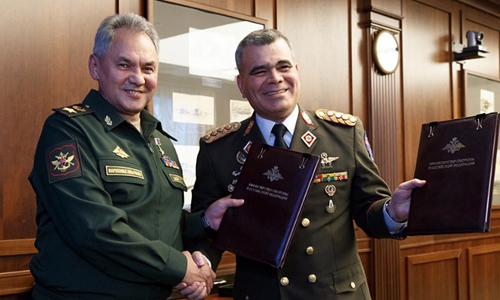HOME >> OPINION
Hedging strategy best protects Russia’s national interests
By Pavel Tarasenko Source:Global Times Published: 2019/12/26 22:03:40

Russian Defense Minister Sergei Shoigu and his Venezuelan counterpart Vladimir Padrino Lopez shake hands in Moscow on August 15, 2019. (Russian Defense Ministry photo)
The passing year has been extremely difficult for Russian diplomats responsible for Latin American affairs. In a bunch of countries, including Russia's closest allies, we have seen political instability, protests and even incidents, which were unambiguously interpreted by Moscow as coups d'état and coup attempts.
The row started in January with the apogee of the Venezuelan conflict that had been growing through the last few years. The reason was the decision of the lawmaker Juan Guaido to declare President Nicolas Maduro a usurper and to assume a rival "interim presidency". This step has divided the world into two parts: more than 50 countries including the US supported Guaido, while others refused to recognize him as a legitimate state leader.
The position of Washington is clear: there is no room for Nicolas Maduro in the prosperous and democratic Venezuela of the future. The country is now suffering the worst economic and humanitarian crisis in its history. During the meeting between US Secretary of State Mike Pompeo with his Russian counterpart Sergey Lavrov in Washington, the American diplomat said: "We've asked the Russian government to support the aspiration for democracy and the legitimacy of interim president Juan Guaido and the call that we have made for free and fair presidential elections". However, Moscow repeated that interim problems of any country (Venezuela, Ukraine, Syria and all others) must be solved by its own citizens. Therefore, all the calls for preterm elections are unacceptable. That is a cornerstone of modern Russian diplomacy. But Western politics perceives it as Moscow's craftiness, claiming that the only goal of Russia is to help the "bloody regime" of Maduro to survive.
China also didn't recognize Juan Guaido as Venezuela's legitimate head of state and has slammed US interference into the domestic affairs of the South American country. The similarity of the Russian and Chinese positions on Venezuela can be easily explained. First, the perception of such concepts as "international rule of law" and "global order" are the same - in contrast to the position of the US which promotes the vague concept of the "rules-based order". According to Lavrov, the aim of such concept is obvious - "to revise the norms of international law which no longer suits the West, to substitute it for the 'rules' adjusted to its self-serving schemes which are elaborated depending on the political expediency, and to proclaim the West and only the West as an indisputable source of legitimacy." So, for Russia, the Venezuelan issue has a clear geopolitical dimension: Moscow wants to challenge US' hemispheric power.
Second, both China and Russia are the most important economic partners of Venezuela and current instability jeopardizes the future of bilateral contracts and investments. Over the past 10 years, China has become the main source of external financing for Venezuela. Moscow is also Venezuela's lender of last resort, and its state-owned Oil Company Rosneft is a main geopolitical instrument to support Maduro and Venezuela, which is home to the world's largest oil reserves.
When in 2018 I met Juan Guiado - a young and very active opposition leader, who nevertheless could hardly imagine the course of events in the year 2019 - in Caracas, he assured me: the whole world (including Russia and China) would be better without Nicolas Maduro because he is responsible for the actual collapse of the economy. When Guaido became a self-proclaimed "interim president", his closest advisers tried to persuade me: after their victory all the contracts, signed "correctly and legally", will remain in force. They said that after their "complete and unconditional victory" they would like to maintain trade and economic relations with all countries of the world, but "only to the extent that these countries respect democracy and freedom in Venezuela and contribute to their development". This wording gives ample room for maneuver. The possibility of renegotiating contract terms with Russia and even just refusing to repay remaining debts under the pretext of "protecting national interests" can't be excluded.
Moscow should also think about the future - and it doesn't matter if the opposition gains in the upcoming years or the "Chavistas" stay in power. The lack of such strategic thinking is a chronic illness of Russian diplomacy - whether we talk about Latin America or our closest neighbors. American diplomats do not hesitate to make contacts with representatives of different political groups in countries that interest them most. But their Russian colleagues still do.
Toward the end of the year, the situation in Venezuela has calmed down slightly, but the problems are still there and the frozen conflict can any minute return to an acute stage. It looks like a volcano that has already showed its readiness to erupt. Awareness of the fact that the situation can reverse direction any minute is the main lesson Russia can learn from the turmoil in Venezuela and the crisis in Bolivia. Sometimes the principle "The enemy of my enemy is my friend" should give way to another one - "Pragmatism first". By hedging politically, Russia could foster its long-term commercial interests beyond the crisis.
And this statement seems to be relevant for every country. Earlier this year, the Chinese Foreign Ministry has dismissed as "fake news" a report by The Wall Street Journal saying that Chinese diplomats held talks with the political opposition in Venezuela to protect its investments in the Latin American country. One way or another, it's obvious that in a modern rapidly changing world, flexibility (without compromising core principles) is really important. Instead, keeping all eggs in one basket sooner or later can turn to be very costly.
The author is foreign desk deputy editor at Kommersant daily newspaper (Russia). opinion@globaltimes.com.cn
Posted in: VIEWPOINT